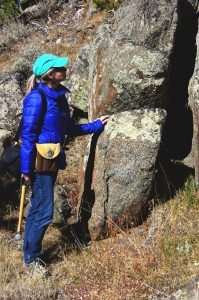August 22, 2018
Women’s Equality Week Q&A with Erin Campbell
Posted by Timia Crisp
For the entire week, we are celebrating prominent female figures in science and science policy to recognize Women’s Equality Day on 26 August.
Today, we are happy to highlight Dr. Erin Campbell. Dr. Campbell is the Wyoming State Geologist and Director of the Wyoming State Geological Survey. Campbell received her B.A. in Geology from Occidental College and her Ph.D. in Geology from the University of Wyoming.
 Who or what has inspired you to pursue your research? Both my undergraduate and graduate advisors (Margi Rusmore and Barbara John, respectively) were inspirational, encouraging, and unflagging supporters during my education. The opportunity to work with them in their research was instrumental in my career development.
Who or what has inspired you to pursue your research? Both my undergraduate and graduate advisors (Margi Rusmore and Barbara John, respectively) were inspirational, encouraging, and unflagging supporters during my education. The opportunity to work with them in their research was instrumental in my career development.
What is an obstacle you have had to overcome to get to your current position? The toughest obstacle was my own doubts. But seeing Margi Rusmore and Barbara John make strong and unique impacts in their fields allowed me to push forward to carve my own path.
Did you have any important mentors in your career, and how did they impact you? In addition to those mentioned above, I would like to recognize Art Snoke, a professor emeritus at the University of Wyoming. He was a department chair while I was teaching there, and his level-headed, well-reasoned approach to addressing difficult situations is an example that I try to follow.
Additionally, I would like to thank Tom Drean, the previous Wyoming State Geologist, who acted was a role model for how the state survey should be run, and who generously helped me to transition into my current position.
What should be the future priorities for scientific research in the U.S.? We should strive to have a balance of fundamental and applied research that will position us to stay on the forefront of scientific innovation, while addressing the energy, mineral, water, and environmental issues that we face.
How can the U.S. ensure that it continues to play a leading role in scientific discovery? In order to maintain a leading role in science, the U.S. needs to encourage education of future scientists from an early age, promote diversity in the scientific workforce, and financially support a broad range of scientific research.









Well said!!! But, of course, I knew she was brilliant. (This is her mother speaking here.)